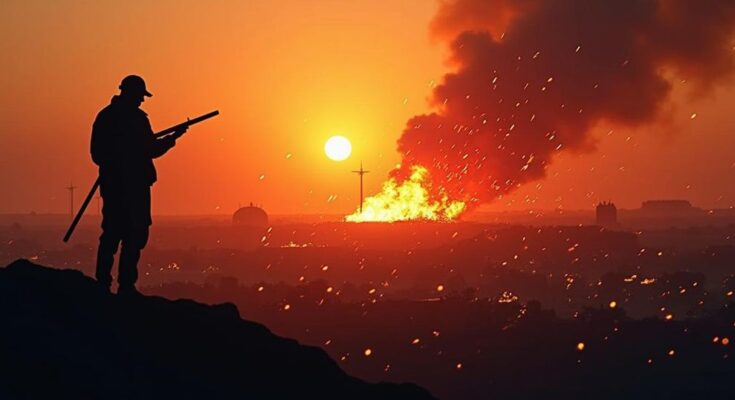Hassan Nasrallah, the Hezbollah leader, was killed in an Israeli airstrike, which is poised to reshape both the group and the wider Middle East dynamics. His death creates a complex scenario with implications for Hezbollah’s military capabilities, U.S. foreign policy, and regional stability amid ongoing conflicts. Israeli operations seek tactical success but lack a long-term strategy, further complicating the geopolitical landscape.
Hassan Nasrallah, the influential leader of Hezbollah, was killed on Friday in an Israeli airstrike targeting Beirut, marking a pivotal moment for the militant group. His charismatic presence had resonated throughout the Arab world, wherein his speeches became widely circulated and even adapted as ringtones by many Lebanese. However, his influence extended far beyond Lebanon, establishing Hezbollah as a formidable political and military force. This assassination signals a seismic shift within Hezbollah, which has evolved from a clandestine group into a powerful political party and one of the most heavily armed non-state militias globally. The implications of his death could reverberate throughout the volatile Middle East, prompting immediate assessments by the Biden Administration regarding the safety of U.S. personnel in the region amidst escalating tensions between Israel and Hezbollah. The Israeli strikes, which also resulted in casualties among Hezbollah’s upper echelons and civilians, have declared a state of heightened conflict. Firas Maksad, a senior fellow at the Middle East Institute, noted that Hezbollah is now “reeling” from Israel’s extensive military operations aimed at crippling its leadership and capabilities. Israel has executed a significant series of airstrikes targeting military infrastructure and weapon caches. Born in a modest setting, Nasrallah became Hezbollah’s leader in the wake of significant conflict in the region. His leadership during the Second Lebanon War in 2006 propelled him further into prominence as a critical figure in the so-called Axis of Resistance, supported by Iran. With a seasoned military force of approximately fifty thousand armed combatants, many of whom possess experience from Syria’s civil war, Hezbollah remains a potent threat to Israel. The audacious Israeli airstrike was notably timed, occurring just after Prime Minister Benjamin Netanyahu’s speech at the United Nations, where he denounced Hezbollah as a “quintessential terror organization.” This strategic operation coincided with efforts for a U.S.-mediated ceasefire that had been negotiated just prior to the strike. Notably, Secretary of Defense Lloyd Austin stated that U.S. officials were unaware of the impending operation until it commenced, while certain Iranian officials have accused the United States of tacit complicity due to its provision of resources to Israel. Despite Nasrallah’s demise representing a tactical win for Israel, experts caution that it does not signify the end of Hezbollah’s operations or the broader conflict. Former U.S. Ambassador Dan Kurtzer underscored that Israel is yet to articulate a long-term strategy to address the challenges presented by Hezbollah, likening the current military campaigns to previous conflicts where Israel eventually felt compelled to withdraw due to unbearable losses. Further complicating matters, there is uncertainty regarding Lebanon’s ability to stabilize in the post-Nasrallah landscape. Zohar Palti, a former Mossad director, proposed that the Lebanese Army would need to reclaim authority from Hezbollah. However, given Lebanon’s longstanding political fragmentation and pressing economic issues, the prospects for a unified and effective response remain bleak. Iran, as Hezbollah’s key ally, has also been shaken by the assassination, prompting an emergency meeting of its Supreme National Security Council. In response, President Biden characterized Nasrallah’s killing as a measure of justice against a leader responsible for numerous attacks against Americans, Israelis, and Lebanese citizens. He emphasized the need for de-escalation in both Lebanon and Gaza, although achieving such stability seems increasingly challenging amidst the ongoing conflict.
The assassination of Hassan Nasrallah represents a critical moment in Middle East geopolitics, impacting not only Hezbollah but also Israel and its allies. Hezbollah’s complex history, rooted in the socio-political dynamics of Lebanon and the broader Arab-Israeli conflict, has allowed it to grow into a significant military and political entity, leveraging support from Iran. Nasrallah’s evolution from a cleric to a dominant figure shaping Hezbollah’s strategy against Israel has made him a focal point in the group’s operations and relations with other regional players. Recent developments have escalated tensions with Israel, prompting U.S. involvement and shifting dynamics that could redefine the region’s political landscape.
In summary, the death of Hassan Nasrallah poses significant implications for Hezbollah and the wider Middle East. While it may offer a brief tactical victory for Israel, the absence of a well-defined long-term strategy complicates the prospect of lasting peace and stability in the region. The potential rise of Lebanese state authority and the response of Iran indicates a complex period ahead, wherein multiple actors will navigate the aftershocks of this pivotal event. Continued U.S. efforts toward diplomacy will be crucial amidst the evolving situation, though the challenges remain formidable.
Original Source: www.newyorker.com




